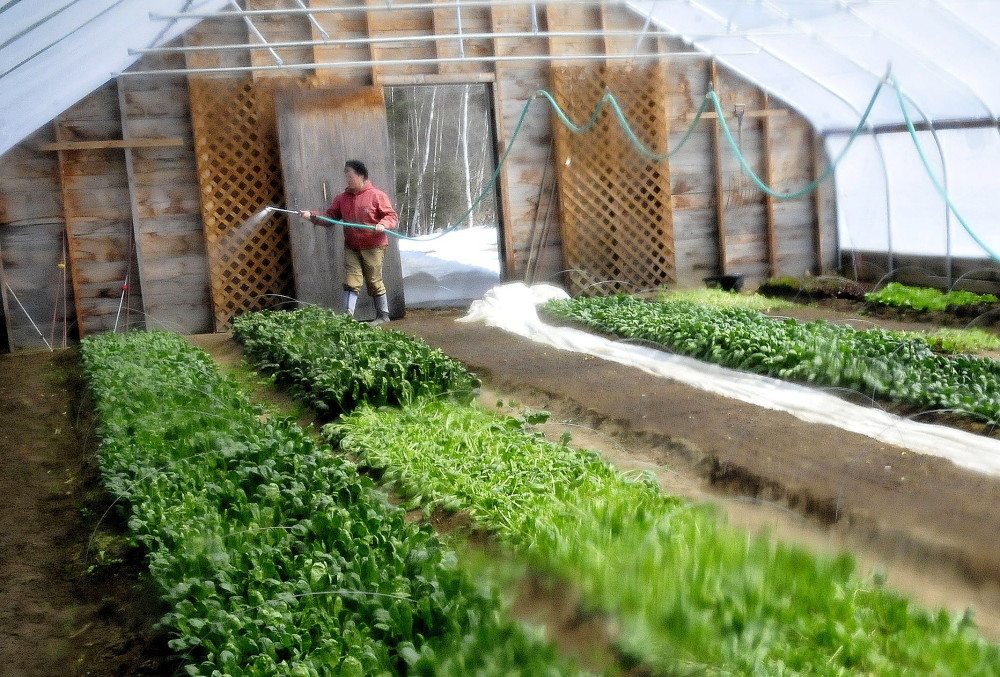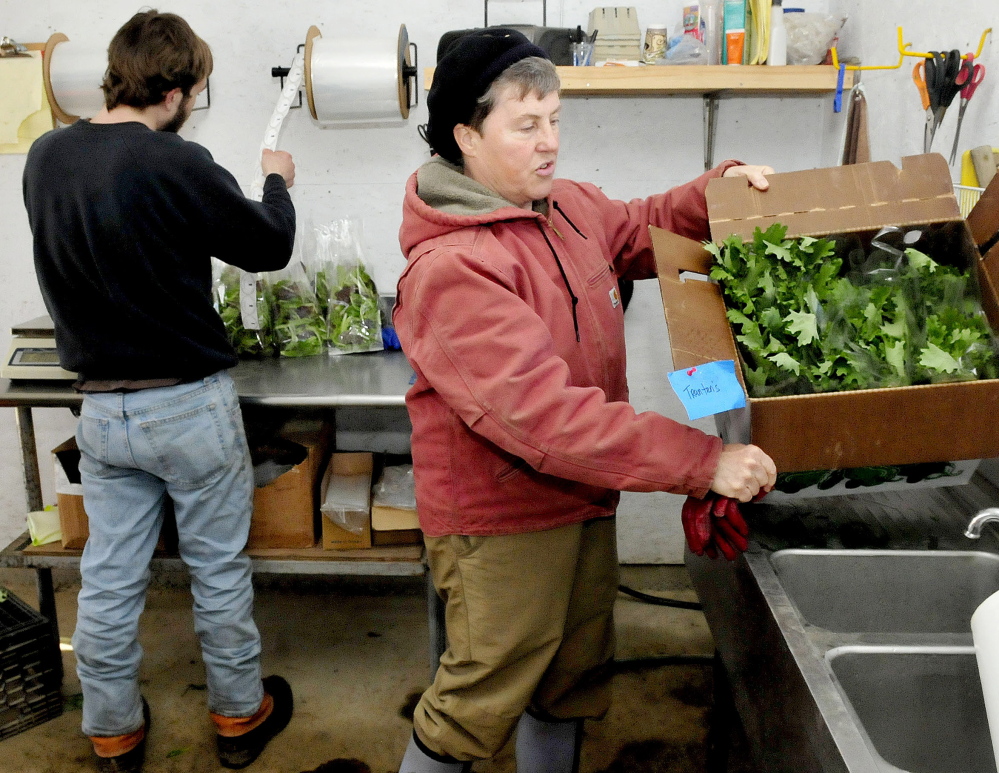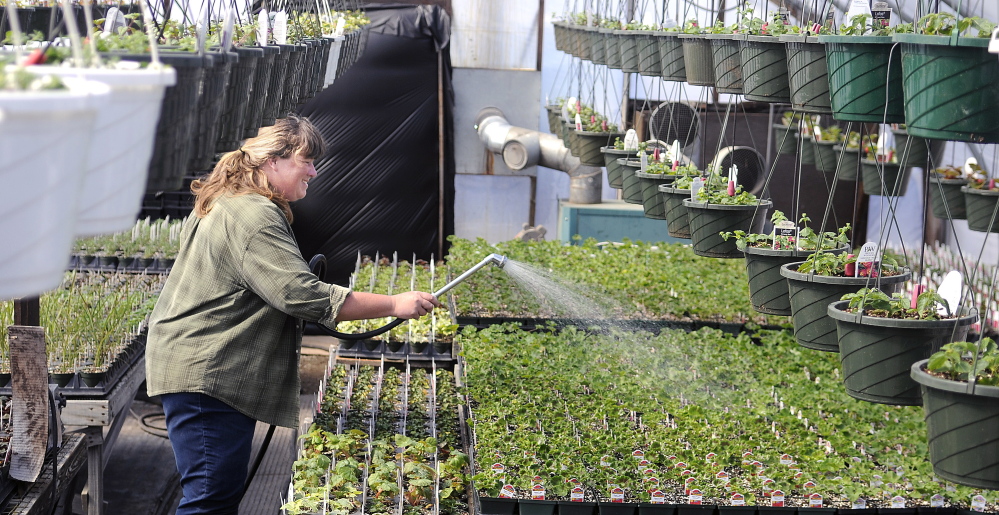MERCER — Rows of lettuce and leafy greens have been ready for picking at Blue Ribbon Farm for about three weeks now.
The greens are grown in high tunnels, which provide a covering that keeps the soil from freezing and captures sunlight — the daytime temperature is currently about 82 degrees — and represent some of the first fresh produce available in central Maine this year.
With snow still on the ground even after significant melting last week, many farmers in the area are preparing for a later-than-usual start this spring. The longer-lasting cold might also contribute to lagging participation in community supported agriculture programs, known as CSAs.
But at Blue Ribbon and some other area farms, high tunnels and greenhouses have provided a jump start to the growing season.
“As soon as we can, we’ll be tilling soil,” Mary Burr, who owns Blue Ribbon with her husband, Bob, said last Wednesday. “Usually that’s in mid to late April. It seems this year will be a little late, but it’s hard to tell. We still have at least 12 inches or more of snow.”
The Burrs have been able to keep the ground from freezing under the protection of the two large high tunnels.
Not everyone has been so lucky.
In Belgrade, Mary Perry, owner of Winterberry Farm, said the unusually cold winter prevented her from harvesting many crops that she would normally collect from high tunnels, including Swiss chard, beet greens, spinach and winter carrots.
“The ground was just so frozen this year for such a long length of time that I lost a lot of that product,” Perry said.
In early March, she was able to plant some winter-hardy crops such as potatoes, spinach and arugula, and hopes they will be ready for harvest in time for the start of distribution through the farm’s CSA.
The farmers agree that they expect this year’s outdoor growing season to be delayed by about one to two weeks, which can make a difference in finances and labor for many of them.
At One Drop Farm in Cornville, owner Ann Mefferd said this year’s outdoor growing season is expected to arrive about a week later than is normal. Ideally, crops are in the ground by about April 15, she said.
However, a long winter last year and with this year’s snow pack still in place, Mefferd said a lot of farms have come to rely more on hoop houses as opposed to the early spring ground.
“I’m sort of accepting that it will be a week or two late. It’s not a normal winter, but we faced it last year so it feels familiar,” Mefferd said. Like Blue Ribbon, Mefferd is already harvesting spinach and other hardy greens from solar heated hoop houses.
She also has hundreds of seedlings that have been started and can cost the farm in extra potting soil and labor if the ground isn’t ready on time for the young plants to be transplanted.
The long winter also means the Mefferd has been changing the layout of their farm — moving some gardens to areas that don’t necessarily have the best soil, but will be drier and sunnier earlier, she said.
When it comes to farmers markets and sales, a late winter can also mean a few weeks of missed sales. “We rely a lot on the vendors who have hoop houses to have products in the extended parts of the season, as well as meat vendors, milk vendors and folks that have storage produce like potatoes, carrots and beets,” said Mefferd, who is part owner of the Pick-Up CSA. “But there’s nothing like when those fresh greens start coming in.”
Both Mefferd and Burr sell their produce at the Skowhegan Farmer’s Market and through the Pick-Up.
Perry runs a CSA and farmstand in Belgrade and said that so far this year the number of signups for the CSA has lagged.
“As slow as it has been for the ground and the farm to warm up for spring, I’m also noticing CSA signups are very slow this year,” she said. “I think people want to do it, but it’s been a hard winter. Money is not readily available and they’re not thinking about spring as quickly as they usually do. It’s been a challenge to get my normal CSA members to say, ‘Oh right, it’s time to sign up for vegetables for the summer.'”
One area where the long, cold winter has benefited her is the planting of flower bulbs. As opposed to a winter where the ground goes through cycles of freezing and thawing, bulbs prefer a winter where the ground freezes and remains frozen, Perry said.
“This year everything went in, it got frozen and stayed frozen, so I’m expecting a wonderful crop of garlic and tulips and any of the perennials I’m sure did really well,” Perry said. “We’re hoping to have a big push of tulips for Mother’s Day.”
Rachel Ohm — 612-2368
Twitter: @rachel_ohm
Send questions/comments to the editors.






Success. Please wait for the page to reload. If the page does not reload within 5 seconds, please refresh the page.
Enter your email and password to access comments.
Hi, to comment on stories you must . This profile is in addition to your subscription and website login.
Already have a commenting profile? .
Invalid username/password.
Please check your email to confirm and complete your registration.
Only subscribers are eligible to post comments. Please subscribe or login first for digital access. Here’s why.
Use the form below to reset your password. When you've submitted your account email, we will send an email with a reset code.